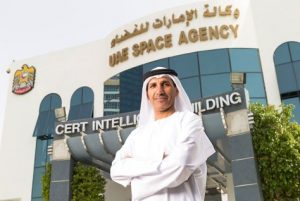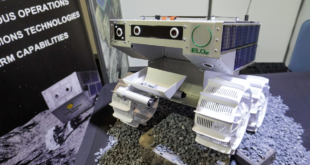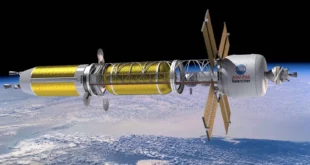
The UAE has become a trailblazer in the Arab world in the field of space and satellite technology, an effort that is a part of a wider economic diversification initiative by the UAE government to ween the Gulf Arab state off of its economic dependency on hydrocarbons. It appears that neighbouring Gulf Arab countries are taking note, as a recent visit to the UAE Space Agency by a prominent delegation from the Kingdom of Saudi Arabia demonstrates.
Dr. Ibrahim bin Mahmoud Babli, Undersecretary for Sectorial Development at the Saudi Ministry of Economy and Planning, led a delegation to the UAE, and his visit included time spent at the UAE Space Agency where Dr. Mohammed Al Ahbabi, the Director-General of the UAE Space Agency, hosted the Saudi delegation.
The Mohammed bin Rashid Space Centre (MBRSC) and the UAE Space Agency are working together across a number of projects that include the Emirates Mars Mission that will send the Hope probe into Mars orbit in 2021 (the fiftieth anniversary of the founding of the United Arab Emirates); the Emirati astronaut programme; the Mars City and plans for Martian colonisation by 2171 (the 200th anniversary of the founding of the UAE), several indigenous satellite programmes, and, just as importantly, a concerted effort to harness and encourage the talents and skills of Emirati youth in science, technology, engineering, and mathematical (STEM) subjects and bring them into the Emirati space sector.
The Saudi delegation were briefed on these Emirati space initiatives and projects, and discussions were held between both parties about possible future cooperation in space science, space exploration, research, and technology development.
Dr. Mohammed Nasser Al Ahbabi, Director-General of the UAE Space Agency, said after the Saudi visit that, “The UAE has become a model for how to organise an advanced space sector capable of launching advanced and ambitious projects that support global space exploration efforts while also enhancing national capabilities. Likewise, the importance of a vibrant space sector in supporting the development of a knowledge-based economy should not be overlooked.”
“The visit by the Saudi delegation provided us with the opportunity to share our unique experience in developing a highly successful space programme through the enhancement of existing national capabilities and the formation of partnerships with key organisations and institutions to facilitate the exploration of Mars and the expansion of space education programmes across national schools and universities,” added Dr. Al Ahbabi.
Saudi Arabia has recently committed itself to the Vision 2030 initiative that seeks to modernise and diversify the Kingdom’s economy, and with it modernise Saudi society by providing more rights for Saudi women and economic opportunities for Saudi youth in general, as well as diversify its oil-based economy much like the UAE is trying to do. Saudi Arabia is already pursuing a number of space initiatives, primarily under the aegis of its King Abdulaziz City for Science and Technology (KACST), but as yet these space efforts are not administered by a central government body – such as a national space agency – in Riyadh.
 SpaceWatch.Global An independent perspective on space
SpaceWatch.Global An independent perspective on space




